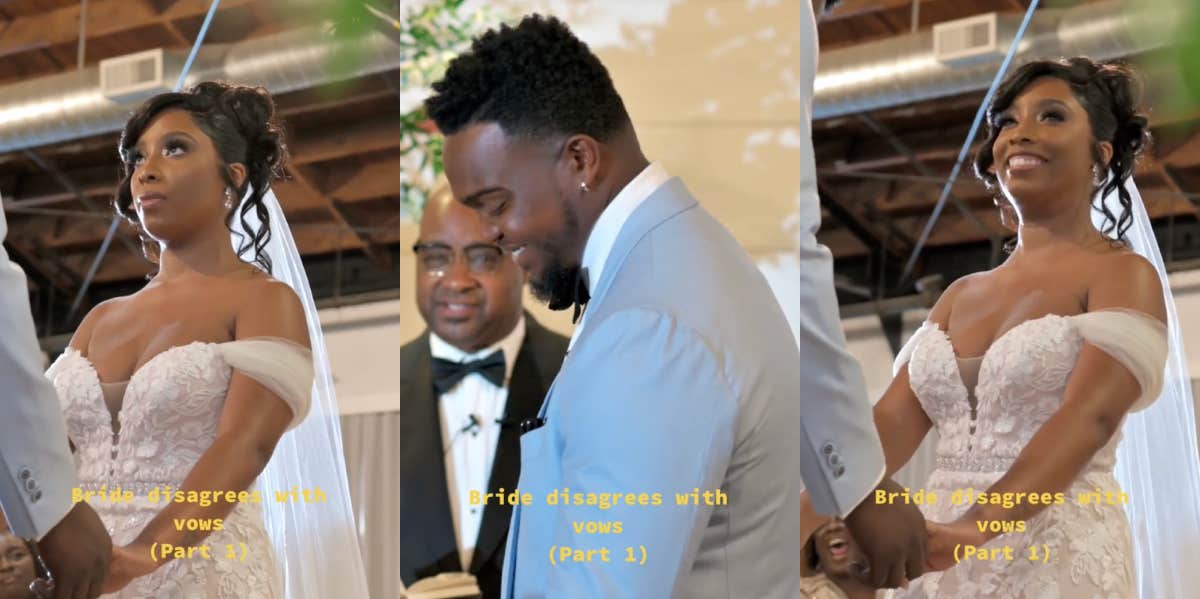Bride Disagrees With Two Of The Marriage Vows During Her Wedding Ceremony — 'We Didn't Talk About This In Counseling'
Her refusal to say those two phrases highlights the outdated traditional wedding vows that are said between couples at the altar.
 @idovideographyatlanta / TikTok
@idovideographyatlanta / TikTok A bride is being applauded after she hilariously refused to recite an important part of the wedding ceremony vows.
In a TikTok video, wedding videographers Amber and Rion captured an unplanned moment between a bride and groom while on the altar at their wedding reciting their vows, which were being read out loud by the wedding officiant. During the bride's turn to recite her vows, she caused quite a stir within the audience of guests after disagreeing with a traditional aspect of the ceremony.
The bride refused to recite two parts of the wedding vows during the ceremony.
In the short video clip, the bride was seen holding her groom's hands as she recited the vows being read to her by the officiant. The bride had no problem reciting the traditional "for better, for worse, for richer" part, but refused to say the next line.
As the officiant recited the next line of the vows, "for poorer," the bride nodded her head but took an extra second to say that part. The audience let out a few chuckles, including the groom, and while the bride was smiling herself, it was clear that she didn't quite believe it.
"We hit that snag about twenty times in counseling," the officiant joked, referring to the bride disagreeing with the "for poorer" part even before standing at the altar. "She made it very clear to [her husband] that you cannot be broke."
However, that wasn't the only part of the vows that the bride disagreed with; in a second TikTok video, the bride recited the usual "in sickness and in health. To love, [and] cherish," but as soon as the officiant said the next part, "to obey," the bride immediately stopped speaking.
She gave the officiant a look, which caused the audience and her husband to burst into laughter once more. "We didn't talk about that one in counseling," she lightheartedly pointed out to the officiant, clearly not on board with saying that part of her wedding vows.
"We did talk about that in counseling," he affirmed. "Yes, we did." When he asked the bride if he wanted her to repeat that line again or to keep going, she humorously told the officiant to keep going.
While the moment between the bride and groom wasn't taken too seriously, it definitely highlights the inherent misogyny and outdated phrases in traditional wedding vows.
In many of those vows, just as the one heard for this bride and groom, phrases such as "to love, honor, and obey" or "to obey and serve" imply a hierarchical structure, where the woman is expected to submit to her husband's authority, suggesting a power imbalance in the relationship.
This concept of obedience can be seen as undermining a woman's autonomy and promoting a subservient role for her within the marriage.
Traditional wedding vows also often emphasize the gendered roles and responsibilities placed on both the bride and groom. The vows may spotlight the groom's duties of being the provider while the bride's role is solely being the caregiver.
Many people praised the bride for standing against ideas that she doesn't believe in.
"I asked the the obey part to be left out. [The] preacher looked at me [with confusion]. He is not my dad, he is my husband. GO GIRL!" one user pointed out.
Another user added, "I've never liked that part in wedding vows 'obey,' like are we not both adults? I'm not treating the person I marry like they're my parents."
"Good for her! Our officiant wouldn’t even put [in] the 'obey' part [of] the vows and I loved that," a third user shared.
Societal attitudes and values are forever evolving, and nowadays many people recognize the need to revise traditional wedding vows so that they are far more inclusive and reflective of the values of both partners who are about to enter a life-long commitment.
Nia Tipton is a Chicago-based entertainment, news, and lifestyle writer whose work delves into modern-day issues and experiences.
